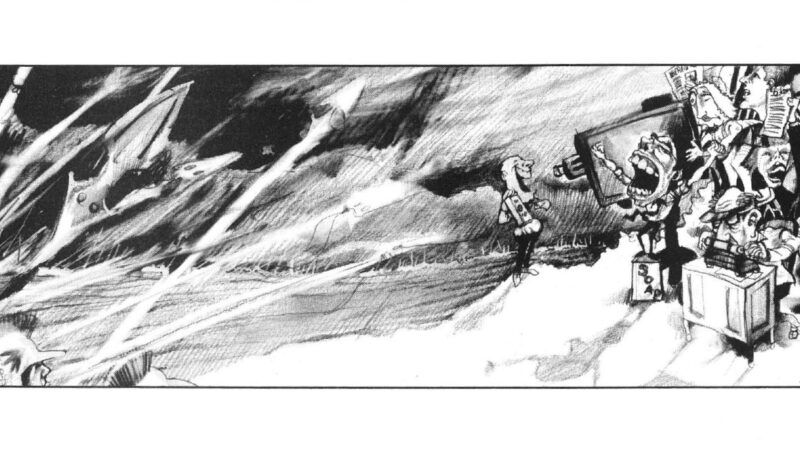Archives: August/September 2023
Excerpts from Reason's vaults

5 years ago
Aug/Sep 2018
"America's main allies and adversaries—Europe, Japan, South Korea, Russia, and China—are facing even more severe problems of falling youth and rapidly increasing aging populations. They will need to bring in young people from elsewhere in the world to refuel their economies. Whether they accept migrants and train them or seek to recruit the most skilled workers from abroad, they will be looking to scoop up talent. If the U.S. instead shuts its doors to immigration, it will inflict upon itself the severe shrinkage in the number of new workers that is challenging other developed countries. The economy will grind nearly to a halt as more and more resources are devoted to taking care of the aging rather than improving the productivity of the young."
Jack Goldstone
"The U.S. Needs More Immigrants"
20 years ago
Aug/Sep 2003
"The result is a growing national security apparatus, including a bigger military, a new Department of Homeland Security, and expanded domestic and international spy agencies. All of these diminish domestic liberty and soak up more and more of our citizens' wealth. These expanded state powers have even tempted some conservatives to agitate for the establishment of an American empire. In the past our government justified supporting unsavory regimes such as Saudi Arabia and Zaire as necessary allies in our nation's struggle against even more menacing tyrants and terrorist organizations. Not surprisingly, to people yearning to be free of their tyrants, our support of their oppressors looked like hypocrisy and thus often encouraged them to adopt anti-liberal ideologies as guides for their struggles against oppression."
Ronald Bailey
"Should Libertarianism Stop at the Water's Edge?"
40 years ago
August 1983
"If the government were to do away with the current tangle of agricultural price supports and subsidies, there's little question that a freer market would drive down food prices for the consumer and hence dramatically lower food costs to an affordable level for many people who now depend on food stamps. Drastic reform of the government's agricultural policies could conceivably eliminate the perceived need for food stamps as general support for low-income households. That the food stamp program was not so conceived at its inception is evident from the early estimates of the limited number of people who would receive stamps. At ever-increasing costs to the taxpayer, and with agriculture and the welfare bureaucracy building up an ever-greater vested interest in the program, food stamps have come to play a far larger role than tiding people over temporary emergencies and assisting those on the very bottom rung of the economic ladder."
David Lips
"How To Get Out of the Food Stamp Trap"
45 years ago
September 1978
"The liberals and conservatives have always represented a false alternative on these issues: the conservatives favoring economic freedom while fighting for every control they could get over ideas and personal moral codes; the liberals fighting for a free press and moral choices while tying up the economy. In neither camp was there a consistent advocate of freedom in both respects—an across-the-board, principled advocate of individual rights."
Steve Wright
"The First Amendment Under Siege"
50 years ago
August 1973
"Our proposal is more than a tax plan. It gives Americans an option for a more positive, democratic, productive, fair, voluntary and rational society. As an example, let's take public education on all levels—elementary, high school and college. Some Americans would undoubtedly choose to financially support the present system. Others would choose to utilize their rebates to shop for free market alternatives: private, religious, or public schools that offer more community control. But public education, with pressure of the rebates and referendum and with the new threat of competitive forces, would be compelled to improve; to become more productive, increase quality, and become more responsive to social and community needs."
John Zeigler
"The Pay-What-You-Want Tax Plan"


Show Comments (8)